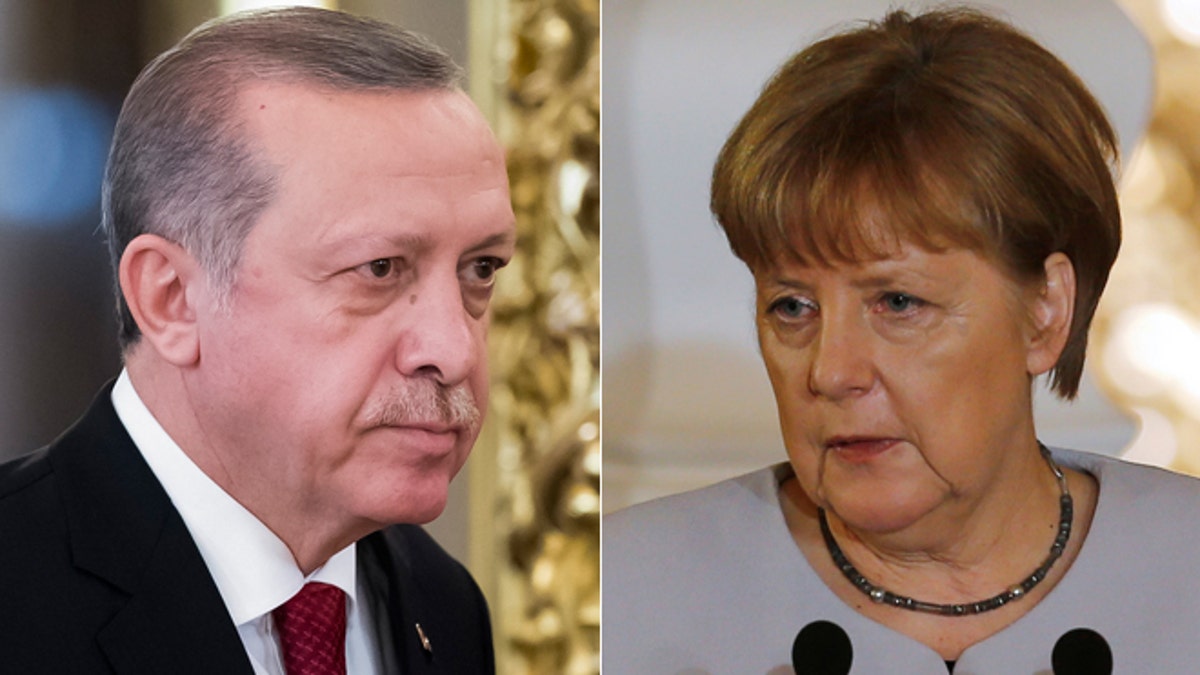
Turkish President Recep Tayyip Erdogan's comments drew a rebuke from German Chancellor Angela Merkel. (REUTERS/Alexander Zemlianichenko/Pool/Amr Dalsh)
Germany warned Monday that Turkey's use of the word "Nazi" to describe its enemies has got to stop.
TENSIONS ESCALATE BETWEEN TURKEY, NETHERLANDS OVER AIRCRAFT LANDING DISPUTE
Berlin's reaction came after the feud between Turkey and the Netherlands escalated over the weekend. The Turkish government summoned the Netherlands' top diplomat to lodge protests after the Dutch blocked two Turkish ministers from campaigning for a sweeping referendum that would ramp up President Recep Tayyip Erdogan's powers. Also over the weekend, the Netherlands escorted Turkey's family affairs minister out of the country and refused to let its foreign minister land there.
Erdogan called the Dutch "Nazi remnants" in response. Turkish Deputy Prime Minister Numan Kurtulmus called the Netherlands' actions "footsteps of the far-right, of the neo-fascism and neo-Nazism that has been on the rise in Europe in the past five or six years."
PUTIN HAILS RUSSIA-TURKEY TIES AS HE HOSTS SYRIA TALKS
German Chancellor Angela Merkel weighed in on the tough comments Monday, calling them "completely unacceptable." She added, "The Netherlands has my full support and solidarity."
Erdogan had already lobbed similar criticism at Germany. He compared its government's policies to "Nazi practices" for nixing campaign events by Turkish officials one week earlier.
Dutch Prime Minister Mark Rutte tried putting a stop to the skirmish. "It was very difficult to agree with the Turkish foreign minister on the logistics of a visit he wanted to pay last Saturday to speak with a limited -- in our view it should be a limited group of Turkish people in one of the official Turkish residences -- it was very difficult to come to a logistical arrangement."
The feud comes at a critical moment for the future of both Turkey and the Netherlands, and has threatened to draw in the rest of Europe. Turkey has tried drumming up support for its April 16 referendum through Turkish nationals outside the country. If the proposed constitutional reforms pass, Erdogan -- who has engaged in a crackdown against his opponents, including the media -- could keep power through 2029, The Guardian reported.
Meanwhile, the Netherlands holds its own general election this Wednesday. The outspoken right-wing candidate Geert Wilders' party is sliding in polls but still almost neck-and-neck with Rutte's party. Wilders has helped spread the populism wave strengthened by the U.K.'s Brexit vote.
Some of Erdogan's supporters launched their own protest in Amsterdam on Sunday, but the situation quickly turned violent. Dutch riot police arrested 13 people, spokeswoman Marjolein Koek said, as media showed police using dogs and a water cannon to break up the crowd.
Turkey also accused police of using "disproportionate" force and "inhumane and derogatory" treatment against Turkish nationals who'd gathered in Rotterdam on Sunday. However, police said the demonstrators had pelted police with bottles and rocks, and one officer suffered a broken hand.
Turkey issued two notes of protest after summoning the Dutch Embassy's charge d'affaires, Daan Feddo Huisinga, according to the foreign ministry in Ankara. The notes centered around the treatment of Turkish diplomats and the Rotterdam incident.
The Associated Press contributed to this report.